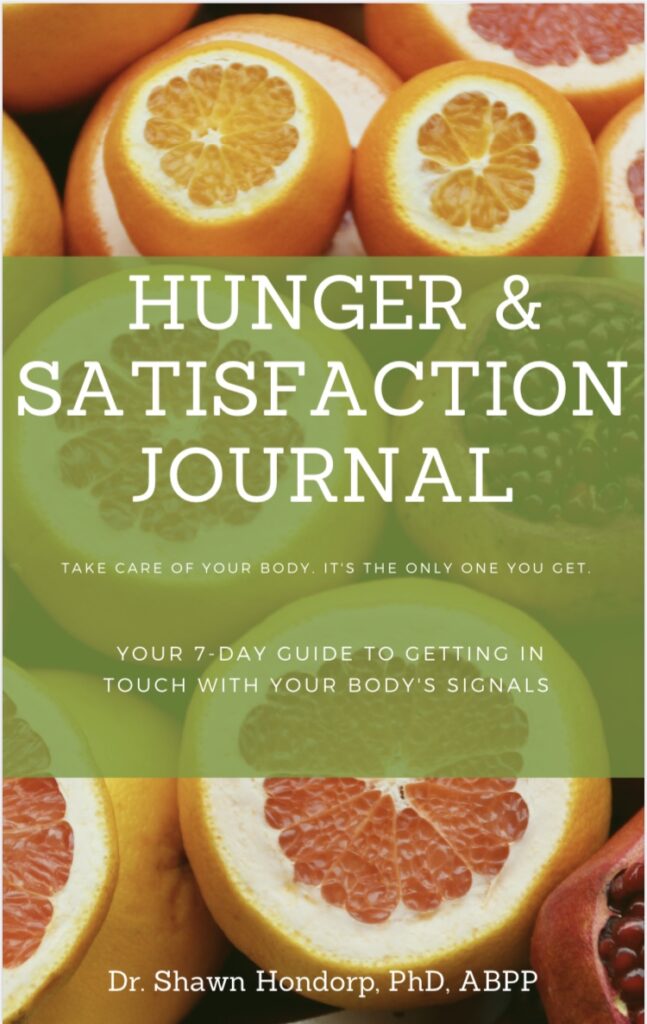What comes up for you when you think about keeping a food journal?
Does it feel like one of the few things that keeps you accountable to eating well and therefore makes you anxious to drop?
Or maybe, though probably less common, the idea of keeping a food journal makes you feel excited to learn about what you are putting into your body?
The Pros and Cons of Food Journaling
Like most things, food journaling (also called self-monitoring) has pros and cons. There isn’t a one-size-fits-all recommendation that works for everyone.
Most major weight loss programs involve some form of food self-monitoring. This means writing down everything you eat and drink, and typically you have a calorie or nutrition related goal you are aiming for (1500 calories, 36 Weight Watchers “points”, 70 g of protein).
This can be done on paper, or using an application like MyFitnessPal or Weight Watchers.
This post will cover:
- Why self-monitoring is recommended and what it can help with
- When it might cause more harm than good
- How to know if you need to throw away your food journal and try a different approach
The Evidence Behind Self-Monitoring
Most programs encourage self-monitoring because it works, at least in the short-term.
Self-monitoring of intake is one of the most consistent predictors of short-term weight loss (Burke, Wang,& Sevick, 2011) in the groups that have been studied. Unfortunately, most research in this area has only been done with Caucasian women (Burke, Wang,& Sevick, 2011) and therefore we know less about how this works in others.
That said, monitoring our behavior is often a good place to start when trying to change anything.
That which is measured, improves
This has been shown to be the case in a wide variety of behaviors. One example includes the fact that tracking physical activity in sedentary adults improves this behavior (Compernolle et al., 2010).
So if tracking helps us change, should we all be doing it?
The Problem of Self-Monitoring over the Long-Term
Although we know self-monitoring is associated with short-term weight loss, what about the long-term?
Unfortunately, weight loss maintenance statistics over the long-term (5+ years after losing weight) are not inspiring. Although some people do lose weight and keep it off for 5 or more years, it is rare.
On average, less than 1 in 5 people lose at least 10% of their weight and keep it off for 1 year (McGuire, Wing, & Hill, 1999; Kraschnewski et al., 2010).
At 5 years out, even among the most successful people in the Weight Watchers program, only 50% kept off a weight loss of at least 5%. For a person starting at 180 lbs, this is a weight loss of just 9 lbs. Of this very committed group of people, only 16% of people were at or below their goal weight at 5 years (Lowe, Kral, & Miller-Kovach, 2008).
Unfortunately, we know that asking someone if they are on a diet to lose weight is one of our best ways to predict if they will gain weight over time (Lowe, Doshi, Katterman, & Feig, 2013).
All of this does not necessarily mean that self-monitoring of food intake is causing the problem with weight loss maintenance. But given that self-monitoring and restriction of food intake is a cornerstone of most weight loss treatment, it appears to be at least failing to help a large portion of people achieve their weight loss goals over the long-term.
Problems with Food Journaling
There are a other problems with food journaling for a long period of time:
- It often induces feelings of restriction. What if you are aiming for 1500 calories per day, but you hit that limit half way through your dinner at 5:00pm and you a still truly hungry? Are you supposed to force yourself to stop eating and just drink water the rest of the night? The problem with restriction of eating is it often backfires, and can make your hungrier psychologically (Zunker et al., 2011; Polivy, Coleman, & Herman, 2005) and biologically (Crum et al., 2011).
- When it pushes you to eat extra just to follow the “rules.” What if you are aiming to have 28 points for the day, but you have all of your means and snacks and this adds up to 25 points and you are feeling satisfied? Too much adherence to a calorie or points goal can encourage eating when you aren’t hungry, which can be problematic if this becomes a regular habit.
- It does not account for normal daily fluctuations in hunger. There are going to be fluctuations in a given day, week, and month in how many calories you are burning, based on your activity level, hormones, and therefore hunger will naturally fluctuate. A calorie or points goal typically does not take that into account.
- It promotes an external focus, which can make it harder to listen to your body’s internal signals. This can become a vicious cycle for repeat dieters as they become less used to listening to their body’s signals and therefore determining if they are hungry becomes more of a challenge. Then they can become more reliant on a food journal to tell them how much they “should” eat that day.
- It can trigger thinking patterns that aren’t helpful, like the diet mentality. The diet mentality is a style of thinking that promotes an externally driven, should-based all-or-nothing mentality about what our bodies need and has nothing to do with the signals our bodies give us. If you are calling foods good and bad, or saying “I messed up today, I’ll start tomorrow” then you may have a diet mentality.
- We may not be able to track both internal and external. If restriction promotes binge eating, this will make listening to our hunger signals more difficult. External guides for doing things can override the internal motivation. For example, when we tell kids to eat something healthy because “it will make us strong, and it’s tasty” the external motivator (“It will make us strong”) overrides the internal (“it’s tasty”) and kids will eat less food and rate it as less tasty. (Maimaran & Fishbach, 2014). So, while food journaling may have helped us to be more aware or learn about nutrition in the past, it may make it very challenging to get in touch with our internal signals now because we just can’t focus on everything all at once.
The Evidence Behind Appetite Monitoring

While the long-term weight loss statistics remain unimpressive, the research on mindful eating and becoming aware of your internal cues is quite promising.
Mindfulness based interventions have been shown in numerous studies to improve binge eating and emotional eating (Katterman et al., 2014).
Appetite Awareness Training (Craighead & Allen, 1995) is often a component of these programs, where specific guidance is given on how to become aware of hunger and fullness signals.
Weight loss with these methods may not occur at all and if it does it likely wont be quick, but they offer hope of long-term relief of the chronic dieting and weight loss cycling and the best chance of freeing up mental energy to focus on other important things in your life.
Is Food Journaling Ever a Good Idea?
From the above, you might be thinking that food journaling is always a bad thing and I never recommend this for anyone. However, I do recommended it at times, in the following cases:
- If you have little to no experience tracking your eating. Again, tracking any behavior is the first step to changing it, and if you haven’t given this strategy an honest go, it may be worth it. If you don’t have extensive knowledge of nutrition, you are likely to learn something, and even if you do, you might be surprised by some of what you see.
- If things are all out of whack. If your eating is all over the map and you don’t have a clear sense of what you’ve been doing, tracking for a few weeks can be a helpful tool to get back on track and provide yourself with some structure to your meals and snacks.
- When done in advance. Although tracking in the moment or after eating can be unhelpful, planning out our meals and snacks is always extremely helpful and tracking or writing out what you plan to have days in advance can be very helpful and reduce overall levels of stress.
- If you can truly use it as a tool to be aware without beating yourself up. People with a long history of dieting typically struggle with this so you need to be extremely honest with yourself. It’s possible that recovered chronic dieters may be able to if they are truly just curious about their patterns. But I think many longtime dieters just convince themselves they can do it without the negative consequences as they are secretly just hoping it will help them drop weight as it may have done in the past.
5 Ways to Know if its Time to Ditch the Diet Journal

Below are 5 ways to know that you should be tracking hunger instead of calories:
- You can recite the nutrition information of most foods in your sleep. If you are a nutrition pro and have done many food journals in the past, you are probably not going to get much out of long-term food journaling. You may just be using it as a way to keep yourself “in check” and this restrictive mindset is likely to backfire and lead to increased hunger, cravings and sometimes binge eating.
- You have tracked calories and nutrition information diligently for at least 3 months. You probably have gotten what you are going to get out of it for a while, and it’s probably time to try something different and focus your mental energy elsewhere.
- You have ever experienced binge eating, emotional eating, or strong food cravings. Given that food restriction or anything that promote restriction can increase cravings and binge eating, people who have struggled with this might benefit a lot from a journal focused more on hunger. A study of overweight adults with binge eating disorder found that a mindfulness-based eating awareness program was more effective than standard cognitive behavioral therapy for improving binge eating (Kristeller et al. 2014).
- You are really struggling to change your diet mentality. For many who have dieted on and off throughout their lives, it’s really hard to have food journaling not trigger old thinking patterns that are unhelpful. It’s important to be honest with yourself about whether this tool is really helping you at this point and be open to other options.
- Your food environment is in pretty good shape. Do you generally have healthful foods available and keep unhealthy tempting options out of sight for the most part? If not, that is likely impacting your hunger and craving as well, and might make benefiting from a hunger journal more challenging.
What’s the Alternative?

If the idea of not tracking calories makes you anxious because you feel an urgent need to drop weight quickly, you might not be ready to give up the diet mentality just yet.
However, if you are ready to try a new approach, tracking hunger is a great way to become more mindful of your body’s internal signals.
If you are looking to ditch the food journal and improve your connection with your body’s internal signals, DOWNLOAD OUR FREE 7-DAY GUIDE here. This workbook will give you everything you need to know about hunger and how to track it in a way that will give you a greater sense of empowerment and control over your body and your habits than calorie tracking ever did.
References
Burke, L. E., Wang, J., Sevick, M. (2011). Self-Monitoring in weight loss: A systematic review of the literature. Journal of the American Dietetic Association, 111, 92-102.
Compernolle, S., DeSmet, A., Poppe, L. et al. (2019). Effectiveness of interventions using self-monitoring to reduce sedentary behavior in adults: a systematic review and meta-analysis. Int J Behav Nutr Phys Act 16, 63. https://doi.org/10.1186/s12966-019-0824-3
Craighead, L., & Allen, H. (1995). Appetite awareness training: A cognitive behavioral intervention for binge eating. Cognitive and Behavioral Practice, 2, 249-270.
Crum, A. J., Corbin, W. R., Brownell, K. D., & Salovey, P. (2011). Mind over milkshakes: mindsets, not just nutrients, determine ghrelin response. Health Psychology, 30, 424-429.
Kristeller, J., Wolever, R. Q., & Sheets, V. (2014). Mindfulness-Based Eating Awareness Training (MB-EAT) for binge eating: A randomized clinical trial. Mindfulness https://link.springer.com/article/10.1007%2Fs12671-012-0179-1
Lowe, M. R., Doshi, S. D., Katterman, S. N., & Feig, E. (2013). Dieting and restrained eating as prospective predictors of weight gain . Frontiers in Psychology, 4, 577.
Lowe, M., Kral, T., & Miller-Kovach, K. (2008). Weight-loss maintenance 1, 2 and 5 years after successful completion of a weight-loss programme. British Journal of Nutrition, 99(4), 925-930. doi:10.1017/S0007114507862416
Kraschnewski, J., Boan, J., Esposito, J. et al. Long-term weight loss maintenance in the United States. Int J Obes 34, 1644–1654 (2010). https://doi.org/10.1038/ijo.2010.94
Maimaran, M., & Fishbach, A. (2014). If it’s useful and you know it, do you eat? Preschoolers refrain from instrumental food. Journal of Consumer Research, 41, 642–655.
McGuire M, Wing R, Hill J. The prevalence of weight loss maintenance among American adults.Int J Obes 1999;23:1314–9.
Polivy, J., Coleman, J., & Herman, P. (2005).The effect of deprivation on food cravings and eating behavior in restrained and unrestrained eaters. International Journal of Eating Disorders, 38, 301-309.
Zunker, C., Peterson, C., Crosby, R. D., Cao, L et al., (2011). Ecological momentary assessment of bulimia nervosa: Does dietary restriction predict binge eating? Behaviour Research and Therapy, 49, 714-717.
